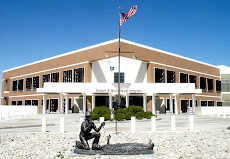By Dan Barber
Public Affairs Officer
Robert E. Bush Naval Hospital
The Robert E. Bush Naval Hospital first opened the doors to its remodeled Labor, Delivery, Recovery and Postpartum (LDRP) care units in the Maternal Infant Nursing Department (MIND) in the summer of 2003… at the time it was one of Navy Medicine’s “Family-Centered” health care initiatives underway. The hospital decided to call the new LDRP units “Desert Beginnings.”
Since that time, more than 4,000 babies have been born at the Desert Beginnings unit… and since 2008 the trend in the numbers of births have steadily been increasing averaging more than 500 births each year. In calendar year 2011 the hospital delivered a record 631 babies.
The LDRP rooms were designed to provide the safe delivery and medical care for the Mothers and newborns, then converting into a large comfortable room for recovery and postpartum care with enough room for family visitors. A chair in the room can be converted into a bed for Dad if he chooses to spend the night.
After the birth of the baby the hospital’s galley (Navy terminology for food services) provides a special menu where Mom’s can order room service.
And if the case arises for the need of an emergency C-Section, the operating room is always ready and seconds away, by design, from the LDRP.
In addition, the Maternal Infant Nursing Department has a professional staff on hand for teaching new Mom’s the benefit of breastfeeding the newborn.
The Robert E. Bush Naval Hospital is the only hospital in San Bernardino County and one of only 40 hospitals in the entire state of California which has been designated as a “UNICEF Baby-Friendly” hospital. When the hospital first received this designation in 2003 there were less than 40 Baby-Friendly hospitals in the United States.
“The safe delivery and care of the new Mom and baby is number one concern in the Maternal Infant Nursing Department,” said Lt. Cmdr. Joanne Costello, Department Head of the MIND.
“We understand that young women want to deliver their baby just as soon as possible. We understand that nine months can seem like an eternity while being uncomfortable, but we don’t encourage early induction of labor before 39 weeks without it being a medical necessity,” said Costello.
There have been young women coming into the LDRP and demanding that their labor be induced and when denied they leave and visit a civilian medical facility to have labor induced. This action can bring harm to the baby and Mom.
“Some early deliveries are necessary because of maternal diabetes or hypertension that could harm either the mother or child,” said Costello.
According to an article published in the San Bernardino Sun at the end of January of this year, “potential complications of early delivery range from breathing and feeding problems to blood infections for the baby. Also, inducing labor before 39 weeks may double some women’s chances of needing a C-section, when this happens Moms also face a greater chance of complications from that procedure.” Costello added, “Delivery between 39 and 41 weeks is best.”
“Medicine has improved the survivability of premature babies, but we should never take a chance in harming an infant by intentionally bringing them into the world before they are ready,” said Costello.
Monday, March 12, 2012
Subscribe to:
Posts (Atom)


